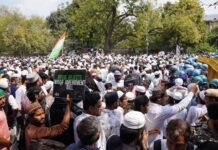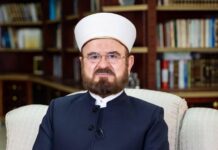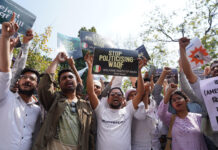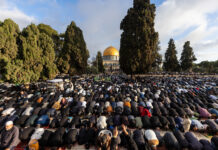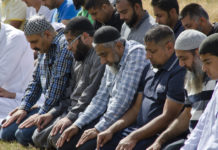2019 was another challenging year for Muslims worldwide with China and India cracking down on their Muslim populations.
Elsewhere, Saudi Arabia continued its westernising reforms and a gruesome far-right terror attack targeted Muslims in New Zealand.
Here are the top international Muslim stories of 2018:
CHINA CONTINUES CRACKDOWN ON UYGHUR MUSLIMS
China was roundly condemned throughout the year by Western states and human rights groups for its crackdown on Muslims in Xinjiang province. However, Muslim countries which are heavily dependent on China were often silent.
In November, the US House of Representatives passed a bill calling for sanctions on members of the Chinese government to counter what it called the “arbitrary detention, torture, and harassment” of Uighur Muslims. The purpose of the bill was “to address gross violations of universally recognised human rights, including the mass internment of over 1,000,000 Uighurs.” It also accused China of “systematically discriminating” against Uighurs by “denying them a range of civil and political rights, including the freedoms of expression, religion, movement and a fair trial.”
Subscribe to our newsletter and stay updated on the latest news and updates from around the Muslim world!
China said its policy in Xinjiang was “about fighting violence, terrorism and separatism,” adding that “thanks to those efforts, Xinjiang hasn’t seen a single terrorist attack over the past three years.”
PAKISTAN AND INDIA CLASH OVER KASHMIR
Heightened tensions between the two nuclear-armed powers stemmed from a suicide car bombing on February 14 in which 40 Indian security personnel were killed. A Pakistan-based group, Jaish-e-Mohammad, claimed responsibility for the attack. India blamed Pakistan for the bombing and promised a robust response. Pakistan, however, denied any involvement.
Twelve days later, India and Pakistan conducted airstrikes against targets in each other’s territory. The first airstrike was conducted by India on February 26 in the vicinity of the town of Balakot in Khyber Pakhtunkhwa province in Pakistan, several miles inside the province’s boundary with Pakistan-administered Kashmir. Pakistan’s military described the Indian planes as dropping their payload in an uninhabited wooded hilltop area near Balakot. India characterised it to be a preemptive strike directed against a terrorist training camp, and causing the deaths of a “large number” of terrorists.
The second airstrike was conducted during daytime on February 27 by Pakistan in a region of Indian-administered Kashmir. A dogfight during this airstrike caused an Indian warplane to be shot down and its pilot to be taken prisoner by the Pakistan military before being returned on March 1.
The fighting has continued intermittently since then and India revoked Kashmir’s autonomous status.
INDIA CRACKS DOWN ON ITS MUSLIM POPULATION
India was accused by human rights groups and activists of promoting an aggressive Hindu nationalism that first and foremost targets the country’s 200 million Muslims.
In October India’s Supreme Court awarded Hindus control of a site in the town of Ayodhya where Hindu mobs destroyed a historic mosque in 1992. Hardliners among India’s majority Hindus, including supporters of Modi’s Hindu-nationalist Bharatiya Janata Party (BJP), believe that Lord Ram was born at the site where the Babri Mosque existed. They say that the first Mughal emperor Babur built Babri Mosque on top of a temple at the site.
And in December a new anti-Muslim citizenship bill was passed in Parliament, sparking mass protests around the country. The Citizenship Amendment Bill (CAB) offers amnesty to non-Muslim illegal immigrants from three countries – Afghanistan, Bangladesh and Pakistan. Critics across India say the bill is discriminatory. The ruling Hindu nationalist BJP says the CAB will give sanctuary to people fleeing religious persecution.
FAR-RIGHT EXTREMIST GUNS DOWN MUSLIMS IN NEW ZEALAND
In March, 50 worshippers were killed in two mosques in New Zealand. The suspect, Brenton Tarrant, faces 50 murder charges and 39 attempted murder charges. He is currently being detained in solitary confinement at the high security Auckland Prison in Paremoremo ahead of a trial next year.
The mosque attacks on March 15 were the deadliest mass shootings in New Zealand’s history. Prime Minister Jacinda Ardern described the attacks as “one of New Zealand’s darkest days”. She has vowed to ban all types of semi-automatic firearms.
TERROR ATTACKS TARGET CHRISTIANS IN SRI LANKA
On April 21, Easter Sunday, three churches in Sri Lanka and three hotels in Colombo were targeted in a series of coordinated suicide bombings. 259 people were killed, including at least 45 foreign nationals and three police officers, and at least 500 were injured.
According to Sri Lankan government officials, all seven of the suicide bombers in the attacks were Sri Lankan citizens associated with National Thowheeth Jama’ath, a local “Islamist” group with suspected foreign ties. On April 23, Amaq News Agency, a propaganda outlet for ISIS, stated that ″the perpetrators of the attack targeting the citizens of coalition countries and Christians in Sri Lanka were Islamic State fighters.″ The Criminal Investigation Department has however stated that there was no evidence of its direct involvement and the group was convinced by the perpetrators to take responsibility.
The attacks sparked a wave of anti-Muslim violence across Sri Lanka.
SAUDI ARABIA INTENSIFIES WESTERNISATION PROCESS
Crown Prince Mohammed bin Salman continued to implement his liberal reforms for a “modern” Saudi Arabia which are poised to change the Kingdom beyond recognition.
He has significantly restricted the powers of the religious police, and established an entertainment authority that has begun hosting comedy shows, professional wrestling events and monster truck rallies. The Saudi cabinet also approved a new residency scheme for foreigners enabling expatriates to permanently reside, own property and invest in the Kingdom.
The Saudi Government also enacted a law that allows women above 21 years old to obtain passports and travel abroad without needing the permission of their male guardians. And Mohammed bin Salman invited people to visit the Kingdom to see the transformation, asking for people to meet Saudi citizens for themselves.
ISIS LEADER ABU BAKR AL BAGHDADI IS “KILLED”
In October, President Donald Trump said that ISIS leader Abu Bakr al Baghdadi had been killed in a U.S. military operation in northwest Syria. Trump said Al Baghdadi detonated his suicide vest during a raid by special forces.
Baghdadi was born near Samarra, north of Baghdad, in 1971, and reports suggest he was a cleric in a mosque in the city around the time of the U.S.-led invasion in 2003. Some believe he was already a jihadist during the rule of former Iraqi leader Saddam Hussein. Others suggest he was radicalised during the time he was held at Camp Bucca, a U.S. facility in southern Iraq where many al-Qaeda commanders were detained.
Baghdadi emerged in 2010 as the leader of an umbrella group that included al-Qaeda in Iraq, and rose to prominence when ISIS fighters captured the Iraqi city of Mosul in 2014, when he declared the creation of a “caliphate”. That was the only time Baghdadi was seen in public. He reappeared in a video released by ISIS earlier this year.
There was some scepticism over reports of his death given the number of times false claims that have been made before.














